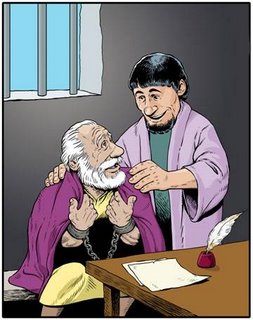 Seems I indirectly started a series on the Scriptures (and assumed “Scripture” verses) which are alleged to support purgatory. I think I will stay on this subject for awhile. I figure that if a refutation of the doctrine is to be made, it starts with the Scriptures Catholics claim imply a purgatory. With this in mind we go to 2 Timothy 1:16-19 which reads:
Seems I indirectly started a series on the Scriptures (and assumed “Scripture” verses) which are alleged to support purgatory. I think I will stay on this subject for awhile. I figure that if a refutation of the doctrine is to be made, it starts with the Scriptures Catholics claim imply a purgatory. With this in mind we go to 2 Timothy 1:16-19 which reads:May the Lord give mercy to the house of Onesiphorus, because he often refreshed me, and he was not ashamed of my chain, but having come to Rome, he more diligently sought and found me. May the Lord give to him to find mercy from the Lord in that Day. And in what things he served in Ephesus, you know very well.
The argument usually goes like this:
From the context, it seems certain that Onesiphorus is dead (This is also the opinion of the Interpreter's Dictionary of the Bible; vol 3; p 603). Paul praises his Christian friend, Onesiphorus, for his good work, but notice Paul does not presume immediate entrance into heaven for his dear friend (Even if Onesiphorus is not dead, Paul still asks the Lord to be merciful). Why be merciful, if all Christians go straight to heaven? We either have Paul praying for a dead person, or we have him interceding for him for mercy on his judgment day. In either case, purgatory alone can explain such thoughts of Paul. If there is no purgatory, then Christians go straight to heaven, which is the popular Protestant belief. If this is so, then Paul's remarks are totally off base; it would be meaningless to ask mercy for Onesiphorus. Purgatory alone makes the passage coherent (see here Purgatory).
Onesiphorus was very faithful. In spite of Paul’s situation (remember Paul was chained to a soldier), he not only sought him out, but did so diligently. Paul was very thankful for his faithful disciple and bestowed his blessing upon him and his family. The context of the passage doesn’t really reveal if Onesiphorus is alive or dead. Paul could have easily stated the same if Onesiphorus was away or jailed; thus he bestows these blessing upon his family residing in Ephesus. The Roman Catholic priest who wrote this allows for the possibility that Onesiphorus is alive, which is a rarity considering many do not waver and claim he is dead. Yet, Catholic tradition state that Onesiphorus died in 81 A.D. (see here: St. Onesiphorus) and considering that these sources place Paul’s death at around 67 A.D. (see here: St. Paul) this would place Onesiphorus’ death some 14 years AFTER Paul. For those who insist that Onesiphorus is dead in the passage, this would be a case where a Catholic tradition contradicts Catholic apologetics.
Yet, the writer assumes that a purgatory is implied even if Onesiphorus is alive and he bases this on Paul’s prayer for mercy on “that Day.” This is a leap in logic considering that God can grant mercy at the general Judgment without the need for a purgatory. This would entail reading purgatory into the verse. There is no reason to jump this far considering that the fact that God allows us into heaven is based on His mercy. But why did Paul specifically pray for mercy upon Onesiphorus, especially if there was no reason to? It can be gathered from the context of the verse that Paul was merely being reciprocal to the house of Onesiphorus. In other words, he prays for mercy upon Onesiphorus because Onesiphorus had mercy on him with his visits. There is no need to inflict purgatory into the verses when there is nothing which lends to it.
In closing, I must mention that, according to Rome, the majority of us will endure purgatory. Only the saints and those who die in martyrdom will bypass it. Scripture evidently speaks of a heaven and a hell, but for purgatory, where the majority will go, it’s odd that the writers can only muster “implications.” That's quite an oversight. Indeed, it is odd that one could only muster implications considering its importance in the afterlife. Asides from its absence in Scripture, we realize that for almost two centuries there was nothing which even remotely resembled afterlife purgatorial thought, Origen and Clement of Alexandria being the first to indulge a concept of it with its fruition coming in the 12th century.
































4 comments:
Here's the line I would pounce on:
"In either case, purgatory alone can explain such thoughts of Paul."
I have a feeling if I go and start checking both Catholic and Protestant commentaries, this statement will crumble.
You know what's interesting as well- the RC argument assumes the "Christ as Judge" motif- better start praying to Mary and the saints to ask Christ to have mercy. To me this is one of the worst aspects of a belief in purgatory
Hi Jim,
Yep, I agree. I don't believe that any Catholic commentary would agree with such a statement, and definitely not the Protestant.
I'm reading Bainton's "Here I Stand: A Life of Martin Luther" and realized how I had forgotten how the pre-Reformation "Jesus the Judge" view is still alive and well, not amongst all Catholics, but in various cultures, such as the Latino culture. My memories as a former Catholic are filled with this. I believe this is why these cultures indulge Mary all the more. After all, only she can soothe the wrath of her Son.
Peace,
Ray
Ray,
My experience too as an RC boy was filed with the distance/ separation of Jesus with sinners.
Yes "Jesus the Judge" is present also in Protestant circles. He died for sinners and yet hates them(??) When the saving work of Christ is minimized to the amplification of his Lordship, I think this happens.
Jesus is Lord precisely because he is Saviour.
In the RC piety, Jesus' love for sinner is obscured because they are taught by practice to go to penance.
Lito
Hi Lito,
I remember as a boy, growing up in Catholic schools, running into a quite a few priests who rejected the concept of purgatory. One in particular told us during relgion class that he cannot justifiably teach purgatory when the earliest church didn't teach it and Scripture reveals the same. I thought that was very bold but commendable. Some of the older guard were staunch on this belief and instilled the "Judge Jesus" mentality in their teachings.
Btw, are you the same "Lito" who participates on the Bereans forum?
Peace,
Ray
Post a Comment